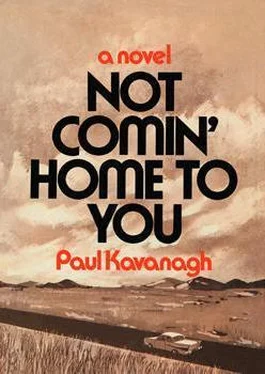Paul Kavanagh - Not Comin' Home to You
Здесь есть возможность читать онлайн «Paul Kavanagh - Not Comin' Home to You» весь текст электронной книги совершенно бесплатно (целиком полную версию без сокращений). В некоторых случаях можно слушать аудио, скачать через торрент в формате fb2 и присутствует краткое содержание. Город: New York, Год выпуска: 1974, ISBN: 1974, Издательство: G.P. Putnam's Sons, Жанр: Криминальный детектив, на английском языке. Описание произведения, (предисловие) а так же отзывы посетителей доступны на портале библиотеки ЛибКат.
- Название:Not Comin' Home to You
- Автор:
- Издательство:G.P. Putnam's Sons
- Жанр:
- Год:1974
- Город:New York
- ISBN:978-0-399-11357-4
- Рейтинг книги:3 / 5. Голосов: 1
-
Избранное:Добавить в избранное
- Отзывы:
-
Ваша оценка:
- 60
- 1
- 2
- 3
- 4
- 5
Not Comin' Home to You: краткое содержание, описание и аннотация
Предлагаем к чтению аннотацию, описание, краткое содержание или предисловие (зависит от того, что написал сам автор книги «Not Comin' Home to You»). Если вы не нашли необходимую информацию о книге — напишите в комментариях, мы постараемся отыскать её.
Not Comin' Home to You — читать онлайн бесплатно полную книгу (весь текст) целиком
Ниже представлен текст книги, разбитый по страницам. Система сохранения места последней прочитанной страницы, позволяет с удобством читать онлайн бесплатно книгу «Not Comin' Home to You», без необходимости каждый раз заново искать на чём Вы остановились. Поставьте закладку, и сможете в любой момент перейти на страницу, на которой закончили чтение.
Интервал:
Закладка:
In her notebook she wrote: Elizabeth Deinhardt, R.N.
She could never seem to stop writing her name in class. Once Miss Tuthill had demanded to see her notebook, and she’d wanted to die of embarrassment. Page after page of permutations of her name. Elizabeth Marie Deinhardt. Betty Marie Deinhardt. Betty Deinhardt. Bette-Marie Deinhardt. And, occasionally, the verbal fulfillment of various fantasies, her name coupled with boys in her classes, boys who scarcely knew she was alive. Elizabeth Fuhrmann. Mrs. Kenneth Fuhrmann. Mrs. Stephen Carmichael. Betty Marie Carmichael.
“I don’t see how this will help you learn American history, Betty. Do you?”
“No, Miss Tuthill.”
“Some students find it helps their concentration when they doodle or draw pictures in their notebooks. But I don’t think you could have been concentrating on your classwork when you wrote all this. You were off in some private reverie, weren’t you?”
“I guess so, Miss Tuthill.”
“You’re an intelligent girl, Betty, but I must say it doesn’t show in your classwork. I think you’d be well advised to concentrate more on what we’re discussing in class and less on what your name may be in years to come.”
“I’m sorry, Miss Tuthill.”
But she just couldn’t. Even when nothing else filled her mind, even when she paid the closest possible attention to what was being said, the words simply refused to stay in her mind. She heard them and forgot them simultaneously. And in this class, Mr. McCulloch’s class, it was even worse. She couldn’t understand algebra. She just couldn’t understand it, period. It didn’t make any sense to her. It was just numbers and letters and they went together in some mysterious way and none of it made the slightest bit of sense to her.
She didn’t see how she was going to pass algebra. She would probably squeeze by in history and English, and she would get a good mark in Spanish because it just seemed to come to her automatically, but she was sure to fail algebra. Unless Mr. McCulloch just passed everybody out of sheer desperation, to be over and done with them. But even if she passed everything she still had another full year to get through before she could graduate, and she didn’t see how on earth she could manage it. Another year of sitting at these little desks and writing her name all over her notebook. Another year of dreaming about boys while none of them asked her out, none of them walked with her, none of them even spoke to her. Another year of eating TV dinners in front of the television set and listening to her parents argue and pretending not to notice when her grandmother passed gas. Granny did it all the time, she didn’t seem to notice it herself, and whatever room she was in would reek in no time at all.
And it gave her parents something else to fight about, her father yelling that he was sick of that old woman stinking up his house, her mother replying that it wasn’t his house in the first place, that it was Granny’s house, and if it wasn’t for Granny they wouldn’t have a roof over their heads. They had that fight at least twice a week, delivering their lines as if they had them carefully memorized, and through it all the old woman would sit impassive, not taking any notice of what was going on around her, and more often than not cutting loose with a beautiful one right in the middle of it all.
At least Granny never argued with anybody. At least Granny never bossed her, never made her feel like an insect. A little gas wasn’t that awful. Everybody did it, after all. It was just that the old woman did it constantly.
Chalk squeaked on the blackboard. Mr. McCulloch was writing something with a lot of X’s and Y’s in it, and numbers and parentheses and decimal points. She prayed he wouldn’t call her to the blackboard to do the problem. She wouldn’t have the faintest idea where to start.
Except it wasn’t a blackboard. It was green, and you wrote on it with yellow chalk. All of the blackboards in the new high school were green. It was supposed to be easier on your eyes, although she had never noticed any difference herself. You would think they would call them greenboards, but instead they always called them green blackboards. If it was green why call it a blackboard in the first place? It was like saying you were going to take a drink out of a plastic glass — if it was made of plastic, where did you get off calling it a glass?
No one else had ever commented on these things. She thought it was very interesting, words and expressions where an old outgrown meaning was left hanging around like that. She had lots of interesting thoughts, she really did, but nobody knew this about her. Nobody really knew anything at all about her except her name and what she looked like and where she lived and what seats she occupied in various classrooms. No one on earth knew the person she was, except possibly her sister Judy, and Judy had moved out six years ago and had never even sent her a postcard.
Unless her mother got the mail and tore up Judy’s cards without showing them to her. Sometimes she liked to believe that, but other times she was pretty sure Judy never wrote those cards in the first place.
What was wrong with her, anyway? She was a few pounds overweight, but Ellen Hacker was at least twenty pounds heavier than she was and that hadn’t stopped Raymond Cault from going steady with her for months. She got a couple of pimples once in awhile, but June Woodhead had bad acne all over her chin and that didn’t keep boys from taking her to parties and movies. She knew what it was — all those girls had personality, and she didn’t.
But she did. She had all these thoughts inside her, only nobody knew about them because nothing ever came out. She was an interesting person. She was.
Judy was right. A person couldn’t stay in a town like this, couldn’t live in a house like the one she lived in with a family like hers. A person had to go out into the world.
If only she was like Judy. If only she had the nerve. If only.
The bell rang. It always did, sooner or later.
After her last class she went to her locker for her jacket. Linda Jensen and Patti Stryker were talking in the next aisle. They were discussing the propriety of letting a boy take you to a drive-in. Linda was saying, “What it depends on is the boy. I mean, it’s all up to the individual. If you trust him it’s one thing, but if he’s got a reputation, you know, then you’re going to have a reputation. Not mentioning any names, but you know what I mean.”
She had only been to drive-ins with her parents. Once in a while her father would be in a good mood and they would do something as a family. It always made her feel good when they started out, but it, never stayed good throughout the entire evening. Sooner or later something invariably went wrong and she wound up sorry they went at all.
There were two drive-ins nearby, one just south of town, the other on Route 30 about halfway between Grand Island and Central City. In Grand Island itself there were two regular movie theaters. The Grand now showed nothing but X-rated films. The Orpheum was running a picture with Ali MacGraw and Steve McQueen. She had seen it the day before yesterday and thought about seeing it a second time.
She started walking toward the theater, then changed her mind. The bill was due to change tomorrow, and she had seen the coming attractions and wanted to see the new picture. She couldn’t remember the name of it now, but Robert Redford was in it, and Cybill Shepherd, and she liked them both. She couldn’t really afford movies two days in a row.
She walked home. There was a bus she could have taken but it was a nice day and she preferred to walk. It wasn’t to save money; she wound up stopping at the Corner Lunch and spending more than busfare on a Coke and Screenplay magazine. She walked because walking took longer and she wanted to postpone returning to her house.
Читать дальшеИнтервал:
Закладка:
Похожие книги на «Not Comin' Home to You»
Представляем Вашему вниманию похожие книги на «Not Comin' Home to You» списком для выбора. Мы отобрали схожую по названию и смыслу литературу в надежде предоставить читателям больше вариантов отыскать новые, интересные, ещё непрочитанные произведения.
Обсуждение, отзывы о книге «Not Comin' Home to You» и просто собственные мнения читателей. Оставьте ваши комментарии, напишите, что Вы думаете о произведении, его смысле или главных героях. Укажите что конкретно понравилось, а что нет, и почему Вы так считаете.












